Menu
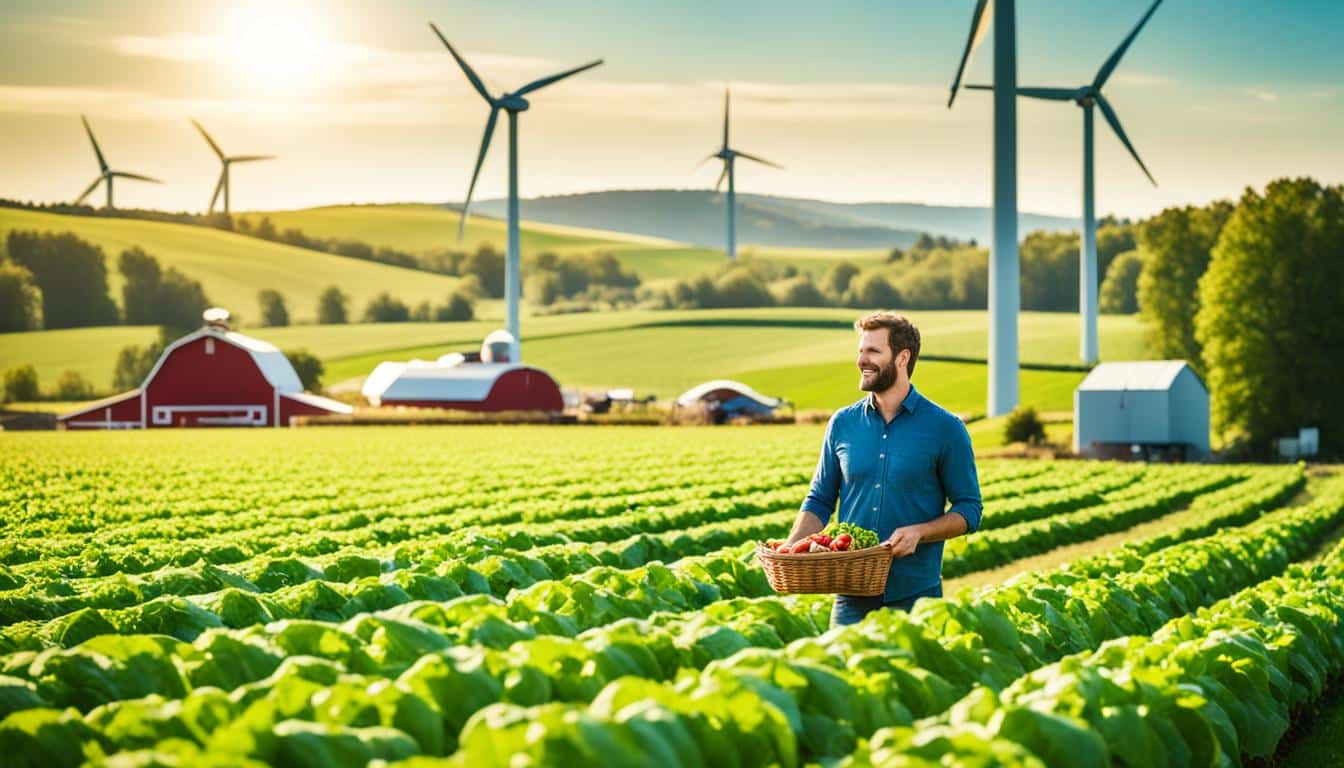
In Puliangudi village, in Tamil Nadu, farmers showed incredible success in their fields. They grew Kitchili Samba rice without chemicals and got an impressive 6 tonnes from just 1.6 hectares. This achievement is proof of the huge benefits of eco farming. Reduced costs and more money for local areas are just some of them. These stories change the way we think about farming.
Around the world, organic farmers are doing amazing things. They are moving from old ways to new, sustainable practices. For example, in Nagapattinam, Tamil Nadu, a farmer got 9.25 tonnes of paddy from one hectare. They used the Trichi-1 variety and only spent Rs. 12,500. Stories like this show how important organic farming is for our future. They help protect the Earth and its resources.
Organic farming is a new way of farming that focuses on being friendly to the earth. It has shown great success over the years. This approach is important for the future of farming. This part looks into what organic farming is and how it started.
Organic farming is all about working with nature. It uses methods like crop rotation and compost to keep the soil healthy. By doing this, it produces food that’s good for people and the planet. For example, using eco-friendly methods, the yield of organic rice has gone up by almost 48%. This shows it’s a key part of farming sustainably.
Organic agriculture is crucial for our planet. It helps keep the earth and our food free from harmful chemicals. By going organic, farmers can lower their costs and grow more food sustainably. Also, using natural ways to control pests means food can be grown without harming the environment.
Organic farming dates back to a time before chemicals were widely used in farming. In the 1900s, the interest in it grew, aiming for healthier, sustainable food. The efforts of projects like LIVESEED, started in 2017, have helped a lot. Over 800 farmers were involved, working towards using only organic seeds by 2036.
In Vermont, Arbor Farmstead shines as a leader in organic farming. It’s helmed by Alisha Utter and Kyle Bowley, pioneers in veganic farming. Their work benefits the community and showcases eco-friendly farming at its best.
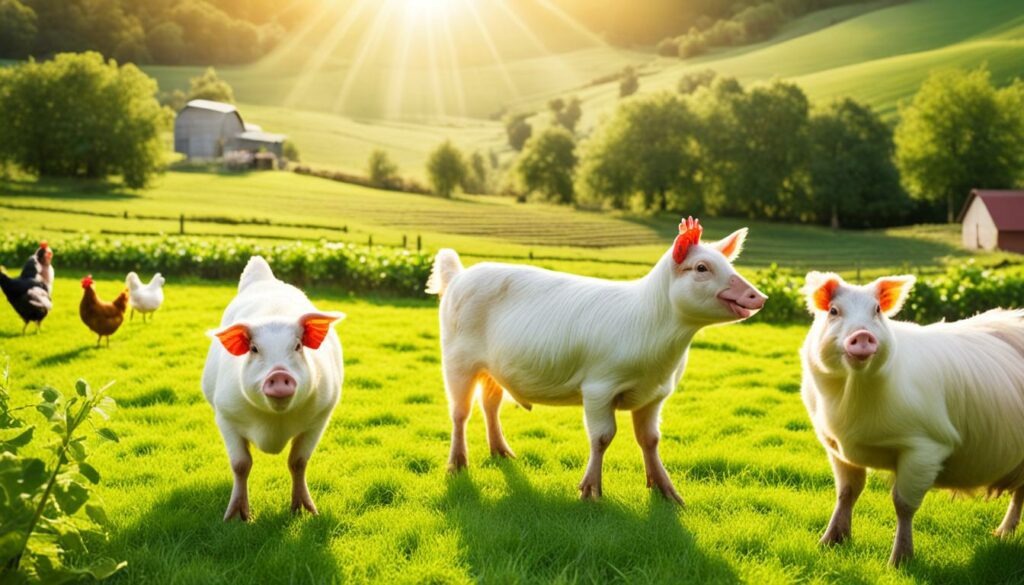
Alisha and Kyle transformed Arbor Farmstead into a model for organic, veganic practices. Alisha handles multiple jobs while pursuing her studies. Meanwhile, Kyle serves as a helicopter pilot in the National Guard.
Together, they’ve made Arbor Farmstead a success, bringing in over $15,000 a year. This comes from farmers markets and their online store.
The farm integrates top organic standards and the best conservation practices. Their focus is on healthy soil, protecting nature, and saving water. They use techniques that keep their food fresh and the land strong.
Alisha and Kyle also use high tunnels and special methods that avoid tilling the soil. This helps the environment and keeps their produce organic. They don’t sell eggs to stay true to their animal welfare beliefs.
Arbor Farmstead has a big effect locally. By selling at local markets, they support the economy and offer healthy food. Their success shows the power of small, sustainable farms.
Alisha’s research identified many other veganic farms around the U.S. Their work has helped highlight the benefits of veganic farming.
NRCS support has been key in Arbor Farmstead’s growth. This assistance has made their dreams for the farm, of a strong financial future and full-time dedication, closer to reality.
Ethos Health is a leading light in healthcare that combines organic farming. Its heart beats under the guidance of the forward-thinking Dr. Ron Weiss in New Jersey. By joining regenerative farming with health care, it has shown great success in the field of organic farming.
Dr. Ron Weiss is more than a doctor; he’s a leader in farm-based healthcare. He leads the Ethos Farm Project, showing how health links to organic food. He believes that your health comes from eating well, not just taking medicine.
At the Ethos Farm Project’s 342-acre farm, created in Long Valley, things are different. Here, patients grow strong again not just with treatments, but with fresh organic food. This method is good for us and our planet, a golden example of farming that heals. The farm uses special practices for the land, water, and wildlife.
Ethos Health’s 30-Day Detox helps patients find a new start. This program is making waves in the health world. Many have shared their stories about getting healthier by eating the Ethos way. It shows that changing your diet can fight illness before it even starts.
Ethos Health isn’t just about one person’s story. It adds to the success stories of organic farming everywhere. Dr. Weiss’s approach is changing the game in farming and health care. His model is showing what’s possible when we combine medicine with growing and eating right.
Good Stead Farm shows how important community-focused farming is in local places. Situated in Midland County, Michigan, Sarah Longstreth runs this farm. It tells a successful story about organic farming. Sarah aims to provide sustainable food and has achieved this by serving over 60 families with fresh, healthy produce.
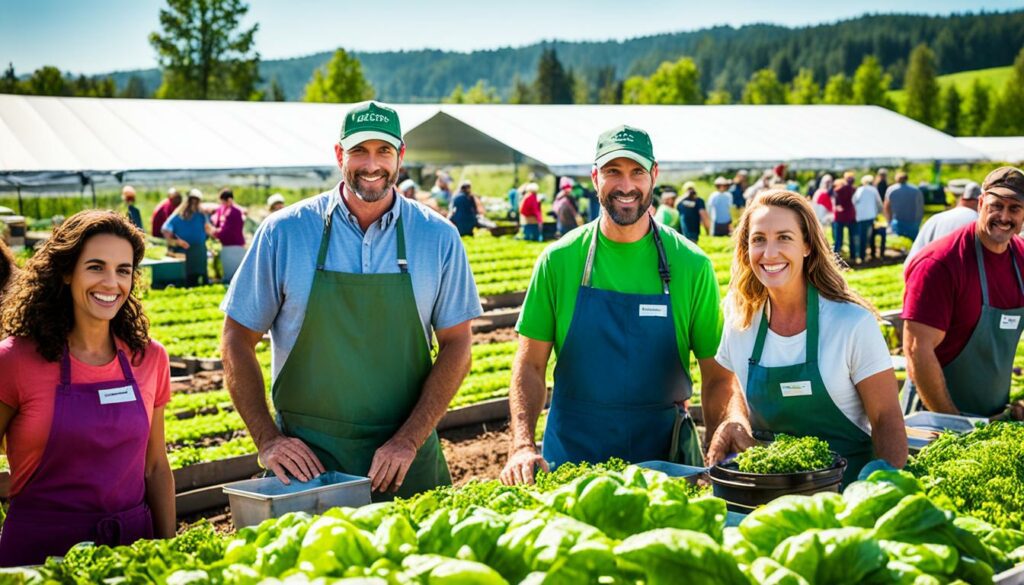
Sarah, the hardworking owner, shifted to organic farming to support her community and the environment. She uses green farming techniques to achieve her goals. Her work not only feeds her family but also benefits the wider community.
The farm grows an amazing range of organic goods from veggies to meat. This makes their products popular even beyond the local area. Sarah’s farm supplies to local restaurants, meeting the demand for organic food. Their items are also big sellers at farmers markets, helping the farm become a key part of the community.
Here’s a look at how their products are making a big impact:
| Market Segment | Impact |
|---|---|
| Families | 60+ households served |
| Restaurants | Local eateries supplied with fresh produce |
| Farmers Markets | Significant presence in local farmers markets |
The farm stands out for its eco-friendly farming methods. Sarah uses techniques like crop rotation and organic soil aids. These fit well with NRCS guidelines that help organic producers with tips and money. The farm’s care for the environment and its high output show its success in organic farming.
James Lake Farms shines in the beautiful Oneida County, Wisconsin. It’s a top example of successful organic cranberry farming. The farm, run by John and Nora Stauner, is a leader in the US organic farming scene.
They started growing organic cranberries and gained fame on November 22, 2017. Their story shows why organic farming is great. It helps make Wisconsin the biggest cranberry producer in the US.
The Stauners work with the NRCS to farm sustainably. They get help not only in advice but also in money. This team effort lets them use farming methods that help the land and its nature. It shows how organic farming is quickly growing.
James Lake Farms is just one success in many. States like Vermont, New Jersey, and Michigan also have great organic farming stories. They often get help from programs that protect the environment and encourage organic farming in their own ways.
A big part of James Lake Farms’ success is agritourism. They join other Wisconsin farms in welcoming visitors. This brings in money and helps people learn about farming. Activities like farm tours and farm dinners make learning fun.
James Lake Farms is serious about doing farming in a way that’s good for the earth. They sell their organic crops at local markets and through CSA schemes. This supports local growers and helps people eat fresh and healthy food.
The farm shows how Wisconsin’s organic and eco-friendly farms are special. They offer places to stay for visitors who come for agritourism. James Lake Farms blends organic farming with eco-friendly tourism well. Their story is key in the success of modern organic farming.
| Statistic | Details |
|---|---|
| Feature Date | November 22, 2017 |
| Operators | John and Nora Stauner |
| Primary Production | Organic Cranberries |
| Top Producer | Wisconsin |
| Agritourism Offerings | Farm Tours, Farm-to-Table Dinners, Apple Picking |
Gene Thornton’s big move from city life to farming shows how nature and people can help each other. His farm, Sneaky Crow Farm, proves that caring for the land and working with others can create amazing things.
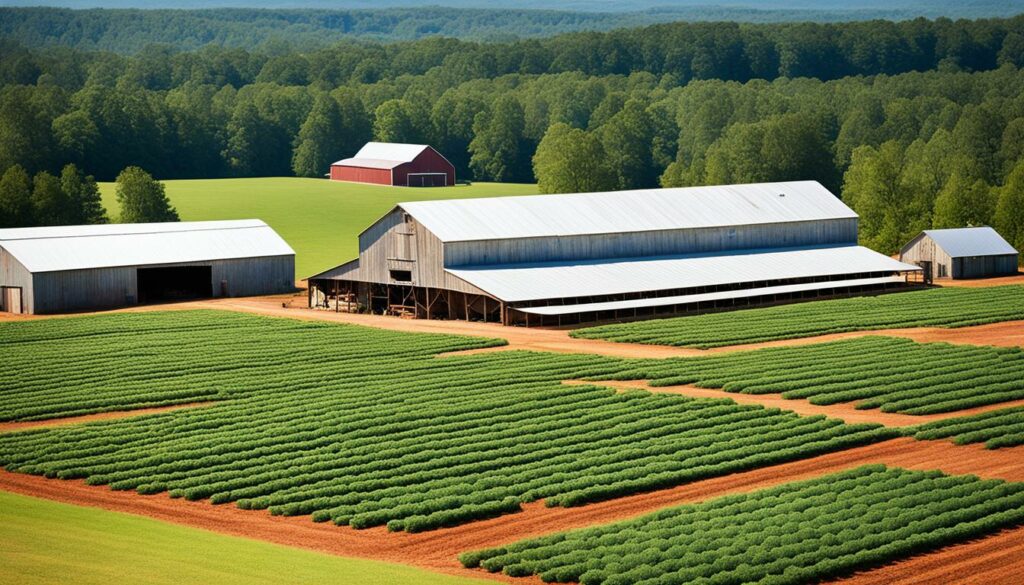
Thornton left the busy city life for the calm of rural Alabama to start his green dream. He wanted to show that farming could be friendly to the planet. His farm, Sneaky Crow Farm, is all about working with nature and the community.
Thornton’s farming ways are leading the charge. He mixes old farm knowledge with new ideas, like changing which crops grow where, making soil rich with compost, and keeping pests under control.
These methods keep the land healthy and make sure the farm uses as few outside things as possible. Thornton also teaches others, spreading the word about why farming this way is good.
Sneaky Crow Farm does a lot more than just grow food. It’s a place where the community comes together. Thornton’s farm not only grows fresh, organic food but also educates and supports local events and farmers.
Thanks to the farm, activities like local food banks and farmer’s markets have become stronger. This all shows how a farm can really pull a community together.
To see where farming is heading now, let’s look at how things have changed over the years:
| Year | Milestone | Impact |
|---|---|---|
| 1862 | Creation of USDA | Distribution of seed packages to farmers. |
| 1930 | Plant Patent Act | Allowed patenting of asexually reproducing plants. |
| 1970 | Plant Variety Protection Act | Exclusive rights for plant breeders of sexually reproducing varieties. |
| 1980 | Diamond v. Chakrabarty | Introduction of utility patents for human-made microorganisms. |
| 1980s-1990s | Policy Shifts | Evisceration of antitrust policies led to mergers in agribusiness. |
| Present | Biotechnology Corporations | Four corporations control significant market shares in seeds and agrochemicals. |
Thornton’s dream shows a shift away from big farming companies to caring for the land. The story of Sneaky Crow Farm isn’t just about farming success. It’s also about making society better by farming in a way that lasts.
Katie Coppoletta has made Fiddlehead Farm in Oregon a shining example of small-scale conservation. Her story in organic farming inspires others. It shows how hard work and careful planning can lead to success.
Together with Rowan, Katie started Fiddlehead Farm. They once planted 21,000 garlic cloves in 4 hours, helped by 44 friends. This stands as a key moment in their journey, showing their strong commitment to sustainable farming.
Katie’s conservation plan focuses on managing land sustainably. With the Growing Farms initiative, Fiddlehead Farm expanded its activities. They moved from growing one crop to a more varied selection, reducing risks.
The Oregon Investment Act helps family farmers get important funds. Katie and Rowan sell their produce at local markets and to Portland’s restaurants. This shows their clear planning and support for sustainable farming.
Fiddlehead Farm has enjoyed great environmental results and high crop yields, thanks to Katie’s sustainable practices. The farm has hosted workshops and events, like the one at the EVOO Cooking School. This shows their link between farming and community.
Consumer demand for charcuterie is rising, particularly in the Northwest. This adds more success to their story. The farm’s eco-friendly methods and management training have been very effective.
People worldwide, from Texas to Australia, have learned about holistic management from Katie. This shows that sustainable farming is successful globally. Katie’s work and the support she offers prove the value of such training.
In all, Fiddlehead Farm is a leading light in small-scale farming. It proves that with the right planning and dedication, farming can bring both environmental and economic benefits.
| Aspect | Details |
|---|---|
| Garlic Planting | 21,000 cloves planted in 4 hours with 44 friends |
| Market Reach | Montavilla Farmers’ Market, Portland restaurants |
| Support | Oregon Investment Act |
| Workshops | “Farmers, Chefs, and Local Charcuterie,” EVOO Cooking School |
| Expansion | Scaled up and diversified post-Growing Farms programme |
| Community Impact | Increased consumer interest in charcuterie in the Pacific Northwest |
| Training Benefits | Holistic Management training; life-changing for many |
In the organic farming success stories, Levi Lyle’s move to no-till is key. He’s shown big improvements in keeping the environment safe and making more money. By not tilling the soil and going organic, Levi has made a real impact.
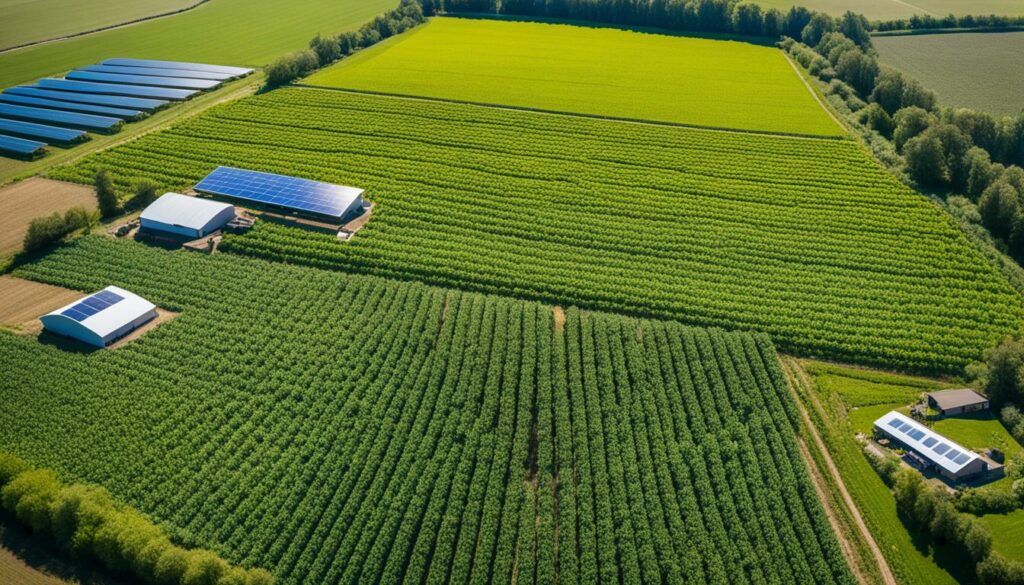
Levi Lyle changed things up on his family’s farm in Iowa. He turned 60 acres into an organic no-till zone. Instead of using GMO seeds, he uses special cover crops and a roller to prepare the soil. This method is getting a lot of praise.
Working with schools like Iowa State and others, Levi is sharing what he’s learning. Together, they are making no-till farming better for everyone.
Levi’s new way of farming is not only good for the planet but for his pocket too. The Soil Health Institute said he made $39.28 more per acre with corn and $11.33 more with soybeans. Plus, not using herbicides means he spends less on petrol, which helps his profit even more.
| Aspect | Details |
|---|---|
| Total Organic Acres | 60 acres transitioning, 500 acres planned |
| Collaborations | Iowa State University, University of Wisconsin, Rodale Institute |
| Increased Income per Acre | $39.28 for corn, $11.33 for soybeans |
| Cover Crops Grown | Cereal rye, hairy vetch, clover, legumes, Austrian winter peas |
| Business Ventures | Levi’s Indigenous Fruit Enterprises (Cherries, Aronia berries, Honeyberries) |
Levi Lyle’s story shows how regenerative farming can work well and make money. As more people want organic food and more help with farming in a good way, his farm is leading the way. This proves that no-till farming can really improve things for the future.
High Ground Organics Farm is managed by Jeanne Byrne and Stephen Pedersen. It shows how farming can work well with nature. They use organic methods that are good for the Earth. Their farm stands as a great example of successful, eco-friendly farming. This approach is important for protecting the environment and wildlife.
At High Ground Organics, they care deeply about the environment. Their farming methods are designed to protect the Earth. They focus on keeping the soil healthy. They do this through organic no-till farming and using different cover crops.
These methods help the soil stay rich and hold onto water better. Cover crops also stop weeds from growing and stop the soil from washing away. This keeps the farm’s land healthy and good for the surrounding wildlife too.
Protecting wildlife is a key part of what they do at their farm. They keep the edges of fields, build hedges, and keep streamsides natural. This helps all sorts of animals and insects to live there. It’s their way of making sure the land is a good home for many species. This is vital for keeping natural areas alive, even within farms.
Keeping the water clean is also essential for Jeanne and Stephen. They are careful with how they use water. And they have created wetlands to filter the water. These actions show their deep commitment to the environment. They make sure the land and water are in good shape while still growing food. Their example encourages others in farming to make sustainable choices too.
High Ground Organics Farm is at the forefront of sustainable farming. It sets a high standard for combining care for the planet with farming. Their work is not just good for the Earth; it also shows that organic farming can be very productive.
Front Field Organic Farm, in Winterville, Georgia, made big progress in saving water in farm activities. They developed a smart plan for using water wisely in their fields. This success story shines a light on how organic farms can save water.
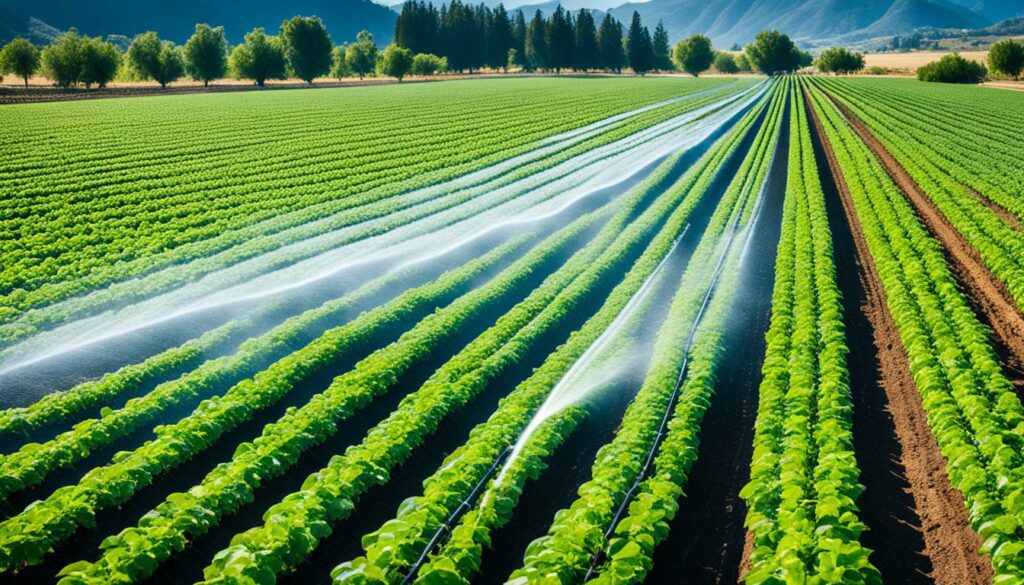
This step underlines the key role of water saving in agriculture. It shows how green farming can win. Their actions prove water saving helps the planet and boosts farm output.
By adopting water-saving methods, Front Field Organic Farm uses less water but grows just as many crops. This proves that organic ways are dependable for using resources wisely. Their focus on smart water use leads the way in farming, showing the gains of water saving.
Front Field isn’t alone in its water-saving success. Jobs well done in water saving happen at many farms in the U.S. For example, Fiddlehead Farm in Oregon increased its crops through small water-saving steps. This was published on October 6, 2017.
Levi Lyle in Iowa also inspires. He uses a no-till system, as taught in “Organic No-Till Farming” by Jeff Moyer. His story, on July 1, 2017, shows good results from farming without tilling the soil.
Not to forget, Jeanne Byrne and Stephen Pedersen also amaze with their farm’s focus on environment and water quality improvement. Their hard work in organic farming, as told on April 21, 2017, is truly meaningful.
Stories like John and Nora Stauner’s from James Lake Farms in Wisconsin, from November 22, 2017, point out organic farming can better water use. This helps cranberry marshes stay healthy. Together, these examples show how essential farming’s water saving is.
Elmwood Stock Farm is a leading example of organic farming achievements, known for its historic background and wide range of products. It’s located in Kentucky’s heartland. Over time, it has moved from being a simple farm to offering a mix of vegetables, livestock, and other products.
The Bell family has farmed for six generations, building a legacy over centuries. Today, Cecil Bell looks after 450 acres while his father manages 150 more. Additionally, Mac and Ann lease 200 acres, growing the farm’s variety.
What began as a cattle farm is now a mix of vegetables, fruits, and animals, proving how organic business strategies can lead to success.
Elmwood Stock Farm has a broad selection, from varied vegetables to meats and value-added goods. John Bell grows 50 acres of veggies for wholesale. Meanwhile, Mac and Ann supply the farm with 200 laying hens, 3,000 chickens, 25 turkeys, and 20 sheep.
“Elmwood produces a bountiful assortment of items deeply rooted in organic principles, supplying both the local community and extended markets.” – Cecil Bell
Elmwood adapts by using new strategies, like seasonal extensions and pasture rotations. They also use the NRCS High Tunnel Initiative to grow crops like tomatoes for longer.
The farm’s use of compost from horse bedding mixed with vegetable waste is part of their eco-friendly practices.
Ann Bell sells the farm’s organic goods at the Lexington Farmers’ Market and to local restaurants. She also arranges custom vegetable boxes for chefs. Each year, they rest one high tunnel to avoid salt and nematode issues, showing smart organic business planning.
| Product | Market | Initiative |
|---|---|---|
| Mixed Vegetables | Wholesale and Farmers’ Market | High Tunnel Initiative |
| Beef (Certified Organic) | Farmers’ Market and Restaurants | Multi-species Grazing |
| Poultry and Eggs | Farmers’ Market and Buying Clubs | High-value Crop Rotation |
The Bell family’s involvement with various farming groups shows Elmwood’s dedication to organic farming. Looking ahead, they may explore the Conservation Stewardship Program for further success.
Wild Hope Farm in South Carolina is a prime example of organic farming success stories. The Belk family manages it with a strong focus on sustainable and innovative methods. This farm has become known for its environmentally friendly farming, meeting the rising need for local and organic food.
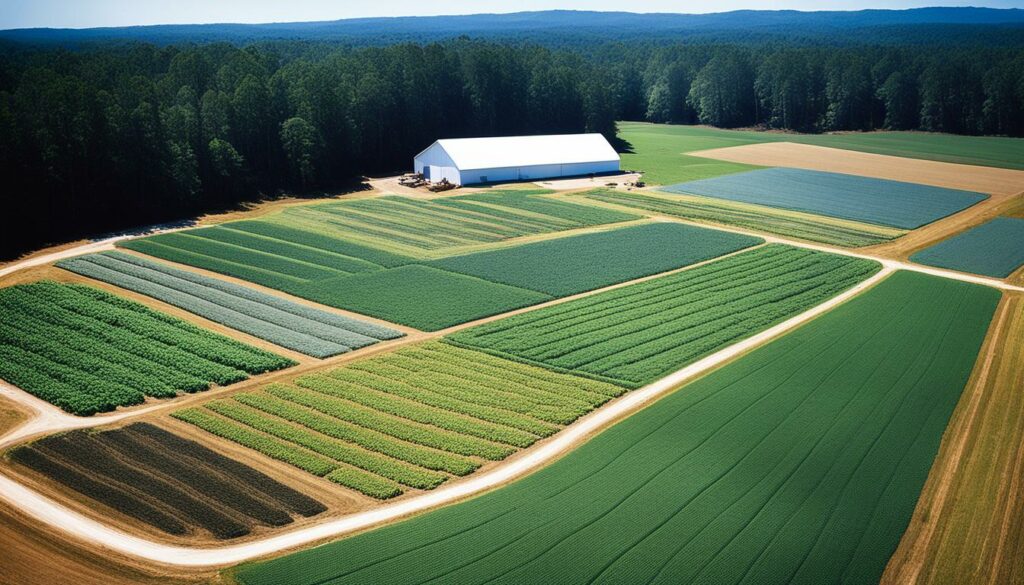
The Belk family brings a deep passion to their work in regenerative land management. They’ve dedicated 12 acres of their 220-acre farm to organic farming. The rest of the land supports forest growth. This balance shows their holistic farming approach.
They sustain their farm through a Community Supported Agriculture (CSA) model. This way of farming is a growing trend that focusses on local food. It helps them better plan and grow crops. Getting payments in advance from CSA members helps make their farm more financially stable and efficient.
Wild Hope Farm is known for its eco-friendly actions. About half of their crops grow without tilling the soil, which is great for the land. They also use horse manure to improve soil health, increasing natural nutrients like phosphorus.
The farm has shown great resilience against tough weather, like heavy rains and droughts. Their ability to keep growing is thanks to their diverse approach. For example, they have a flower CSA and a floristry wholesale business. This shows their flexible and smart sustainable farming.
Focusing on the farm’s own resources, they follow strict USDA organic standards. This means they don’t use artificial fertilizers or pesticides. Their care for the soil keeps it healthy and sustainable. They also make sure to share their farming journey with people through social media and email. This helps their customers appreciate the hard work they put into being eco-friendly.
Looking at the successes in organic farming shared in this article, it’s clear how varied the approaches are. Despite this, they all share a goal of being kind to the planet. This shows that anyone, from a small local farmer to a big eco-project, can make a difference.
Mr. Hussain uses his 75-acre garden to help prison inmates learn a new skill. This not only helps the environment but also gives people a fresh start in life. Then there’s Mr. Glen, who turned his five acres into a sustainable farm after learning new techniques. And the Inoel Poultry Farm started small but is now a major player, proving that organic farming can work well economically.
In Sweden, the rise of organic farming until 2018 shows its huge potential. But later, there was a drop in organic farms and in market share. This shows that, although organic farming can grow, it also faces some tough challenges.
For the future, it’s not just about what we eat, but how it’s made and sold. More and more, we see direct selling options like farm shops and CSAs. These give consumers a direct link to the food they buy and support local farmers. With the help of such new ideas and keeping in mind nature and health, the path of organic farming looks bright. This is a clear sign that choosing to farm in eco-friendly ways can lead to a strong and flexible future.
Organic farming is about keeping soil, ecosystems, and people healthy. It uses natural methods and local cycles. Unlike traditional farming, it avoids synthetic chemicals like pesticides and fertilisers.
Organic farming helps our environment and our health. It keeps soil healthy and supports many plant and animal species. By avoiding harmful chemicals, it also reduces pollution.
Organic farming dates back before modern industrial methods. The early 20th century saw key figures launching the movement. For example, Sir Albert Howard in the UK and J.I. Rodale in the US promoted natural farming. Rodale even started a leading magazine on the topic in 1942.
Alisha Utter and Kyle Bowley are farmers who operate Arbor Farmstead in Vermont. They are known for their innovative work. They focus on growing fruit in a way that does not harm animals or the environment.
Arbor Farmstead’s practices have inspired many. They have made fresh, organic produce available locally. This has improved food security and environmental awareness in the area.
Ethos Health is a special clinic in New Jersey. Dr. Ron Weiss combines healthcare with organic farming there. The clinic grows organic fruits and vegetables. This produce aids in patient recovery and wellness.
Ethos Health’s approach has led to better patient recovery and wellness. This shows that connecting healthcare with organic farming can benefit health.
Sarah Longstreth owns Good Stead Farm in Michigan. She provides local families and restaurants with fresh, organic produce. Her farm is a great example of a sustainable organic operation that involves the community.
Good Stead Farm uses eco-friendly farming such as crop rotation and organic fertilisers. It also applies sustainable methods for irrigation. This helps protect the environment and supports the farm’s soil health.
James Lake Farms leads in producing organic cranberries. John and Nora Stauner use sustainable farming practices. This makes their farm stand out in the organic fruit market.
Gene Thornton moved from Washington, D.C., to Alabama to farm organically at Sneaky Crow Farm. He uses environmentally friendly techniques. His farm brings fresh, organic produce to the local community.
At Fiddlehead Farm in Oregon, Katie Coppoletta focuses on eco-friendly conservation. Her work in organic farming has helped the environment. It has also boosted the farm’s crop yields.
Levi Lyle in Iowa switched to organic no-till farming. This method improves soil health and reduces erosion. It lowers the costs of farming too.
High Ground Organics Farm in California, led by Jeanne Byrne and Stephen Pedersen, protects the environment. The farm encourages wildlife and works to better water quality. It is a leading example of sustainable farming.
Front Field Organic Farm in Georgia conserves water with a smart plan. They show that organic farming plays an important part in caring for resources sustainably.
Elmwood Stock Farm in Kentucky produces a variety of organic goods, ranging from vegetables to livestock. The farm shows how following organic principles leads to success and helps the environment.
Wild Hope Farm in South Carolina is run by the Belk family. Their eco-friendly farming supports the farm’s ecosystem. It helps to preserve the environment and promotes sustainability in agriculture.